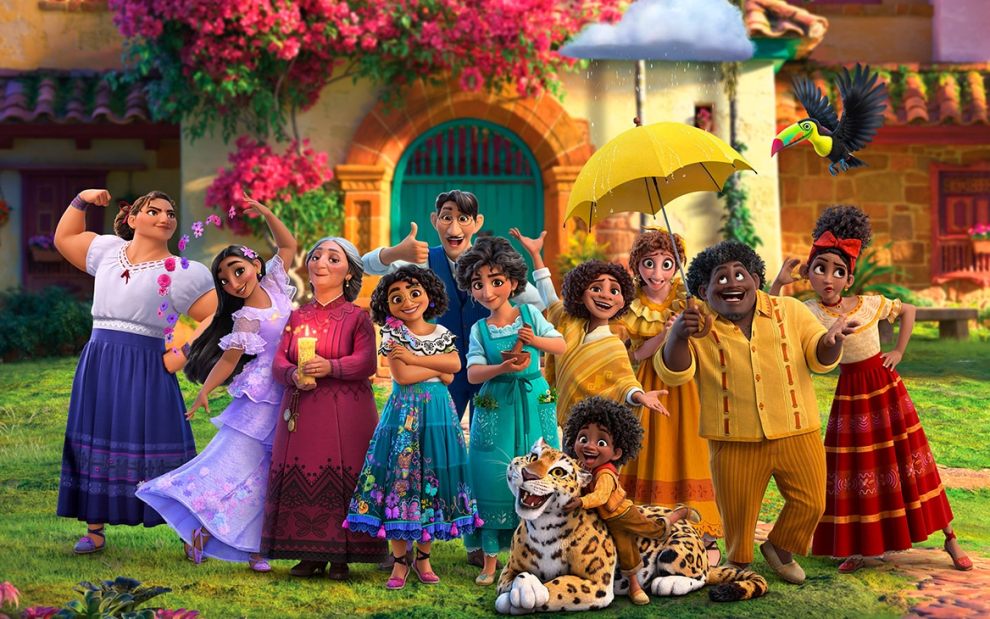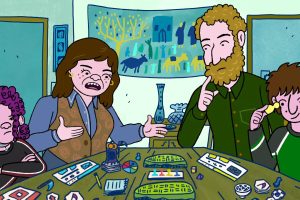In the Disney film Encanto, the Madrigal family’s story begins when Abuela and Abuelo flee civil war in their home country of Colombia. Abuelo sacrifices himself to save his wife and three infant children and out of this sacrifice comes a miracle: Symbolized by a lit candle adorned with butterflies, a magical house (the Casita) embraces the Madrigals and keeps them safe in an idyllic village.
With their safety secured, the miracle continues: Each Madrigal child is given a magical power, referred to as their “gift.” (Mirabel is the exception, which is the fuel of the plot.) Abuela determines that each gift must be used for the good of the community, singing that “we pledge to always help those around us / and earn the miracle that somehow found us / …work and dedication will keep the miracle burning.” (A little theology of works.)
As Encanto is rereleased in theaters this Lent, I am struck by how timely the film is. It inspires us to examine our own gifts and where we fall short of being the person God created us to be. Lent is a time for embracing and tackling our imperfections head on, exactly as God created us, and discerning when those qualities need to be refined and when they need to shine. This season of prayer, fasting, and almsgiving is not meant to be purely penitential for its own sake, but to focus our energies on where we need to grow.
Although it is problematic in the film, Abuela’s encouragement of each member of the family to consider how their gift can make the community better is actually a very significant piece of vocational discernment. To paraphrase Frederick Buechner, where do your great gifts meet the town’s great needs? Perhaps it is to heal, like Julieta; or to ease burdens, like Luisa; or to make people feel heard, like Dolores; or to spread beauty, like Isabela. Each person’s gifts have a distinct role to play in the body of Christ.
We discover early on in Encanto that something is threatening the family’s magic: the Casita is starting to fail and the Madrigal’s magical powers are weakening. Cracks begin to show both in the brick and mortar of the Casita and in familial relationships, straining under the pressure to be perfect and to serve the community and one another.
The film takes us through the Madrigals’ almost purgative journey to heal these cracks. Mirabel seeks whatever is hurting the magic, and in turn, to save the family she loves. The viewer becomes aware that Abuela’s hold on the family is fueled by the fear that, if the miracle dies, she will lose her family. And yet her insistence that everyone maximize the use of their gifts and thus keep the miracle alive is in fact the vice grip suffocating the magic. To move forward, the family Madrigal must offer penance, naming where they have hurt one another through crushing expectations, fractious relationships, or abandonment and exclusion.
This healing comes in the penultimate song, which also offers the most ringing account of vocation. The whole family sings as they stand in the rubble of their collapsed home—and collapsed family. In the end, the family Madrigal discovers that their true gift is not their magical powers, their assigned family roles, or the ways they improve the lives of the townspeople. As Abuela sings, “The miracle is not some magic that you’ve got / the miracle is you / not some gift, just you / all of you.”
What a profound spiritual truth: Who you are in the eyes of a loving God cannot be measured by skills or contribution, but is simply based on who you are as God’s own beloved. When we accept that truth and allow it to be our foundation (just as it is for the rebuilt Casita), we enter a realm of freedom and possibility beyond our wildest dreams—just as God desires for us.
As the Madrigals awaken to the truth that they are more than just their gifts, there is another message for their weary hearts that almost gets lost in the shuffle of the song but is of paramount importance for our Catholic identity. While the Madrigals stand amidst the destroyed Casita, the entire village comes to the family, singing “Lay down your load . . . We have no gifts, but we are many / and we’ll do anything for you.”
It is only through community that the family can begin to heal: Although the people around them have no magical powers and are often the beneficiaries of the Madrigals’ gifts, they are willing to put themselves to work to rebuild the Madrigals’ home. In the end, their humanity is the gift they give back to the family that has given so much to them. Human existence is what ends up being a true gift in this family and is lauded as the Casita’s “the new foundation.”
From the ashes of the Madrigals’ home comes a sign of hope: the sense of community they found when the walls fell. In our Catholic faith, we live this each time we gather at the table of the Lord for the reading of scripture and the breaking of the bread. (Is it any coincidence that Mirabel’s mother, Julieta, possesses the gift of healing through food? Is there anything more eucharistic than this analogy to the bread of life?) When they welcome this community and accept the townspeople’s gift, their own gifts return—but absent the burden of unattainable perfection and free in exactly how they were created to be.
As my husband and I danced, laughed, and cried our way through Encanto, I found myself deeply drawn to the wisdom of the penultimate song: “I think it’s time you learn / you’re more than just your gift.” (Perhaps I needed to hear that message, too!) My life has afforded me the privilege of knowing, loving, and serving some pretty gifted people. In my professional life, I coordinate a leadership formation program for young adults in college campus ministries at some of the most incredible colleges and universities across the country, where the young adults we serve will go on to lead in every sector and face unimaginable pressure to succeed. In my personal life, I have benefited from friends, neighbors, and loved ones who are at the top of their respective fields and who are not immune to familial and societal expectations of strength and perfection.
In considering our vocations, we take stock of the gifts we have been given, but we are not simply our gifts. We are custodians of those gifts; they are tools we use to do good and bring about the kingdom of God, not singular markers of who we are. This is one of the most critical messages of Encanto, which also addresses themes such as generational trauma, colonialism, societal and familial pressures, exclusion of those who are different, and so much more.
We began the Lenten season with the imposition of ashes, reminded of the humility of our human existence. We are exhorted to turn away from sin and be faithful to the gospel. We spend a season assessing the cracks in our own foundation, like the Casita. And then, with the igniting of the flame at the Easter Vigil, light penetrates the darkness. The candle representing the miracle in our own lives—salvation through Jesus Christ—is lit once again. This Lent, we too have the opportunity to strip away all that is unnecessarily burdening us or distancing us from one another and from the perfect God who created even our imperfections.
Image: Disney













Add comment